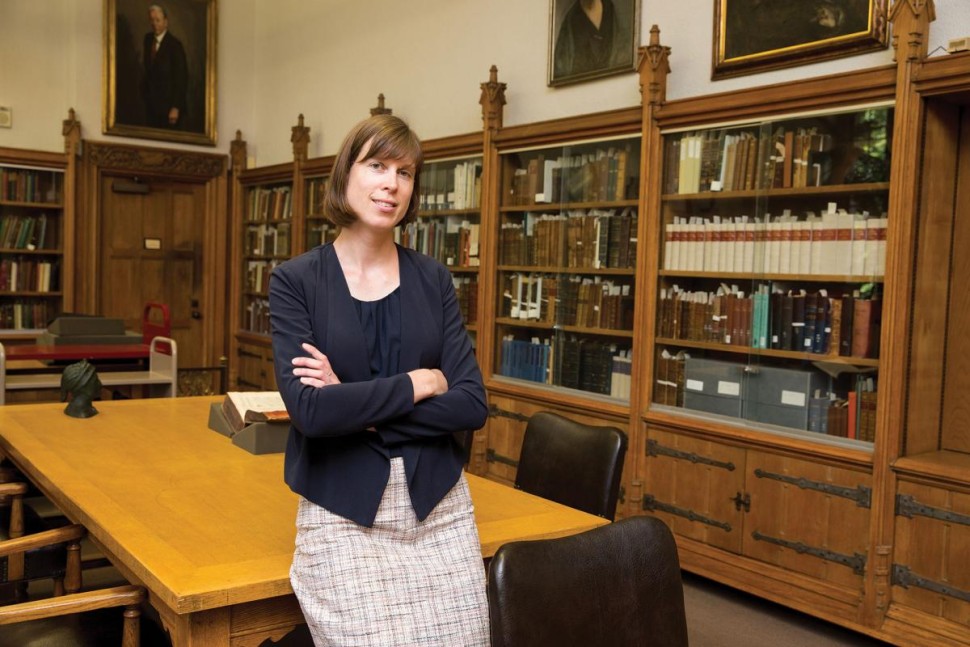EVANSTON - Northwestern University professors Mary G. Dietz and Kelly Wisecup have received funding from Humanities Without Walls for separate research projects related to humanities work in a changing climate.
Dietz, a professor of political science and gender and sexuality studies, and Wisecup, a professor of English, will serve as principal investigators on their respective three-year projects that will bring together interdisciplinary teams of junior and senior scholars from multiple institutions across the Midwest.
Each professor will receive $138,360 from Humanities Without Walls, a consortium of humanities centers and institutes at 15 major research universities throughout the Midwest and beyond, including Northwestern’s Alice Kaplan Institute for the Humanities. Both projects will include a graduate student lab practicum, and culminate with a symposium and edited collections to share research findings with undergraduates and the general public.
“These projects embody exciting new models for collaborative work in the humanities across disciplines and between faculty and students,” said Jessica Winegar, interim director of the Kaplan Institute. “Their synergistic approaches will amplify and expand the contributions of humanistic research to pressing issues related to environments, climate, land and earth.”

Dietz’s project, “Arendt on Earth: From the Archimedean Point to the Anthropocene,” was co-authored and originally conceived by political science doctoral student Alexandra Neame, who will serve as program coordinator. “Arendt on Earth” examines the pluralistic concept of Earth and the crisis of “earth alienation” in the work of the twentieth century political theorist Hannah Arendt.
“We see Hannah Arendt’s rich concept of earth, which encompasses nature, the world of human-made things, and the web of human relationships, as offering significant conceptual resources for grappling with a complex of mutually entangled risks that our planet faces today,” said Dietz, the John Evans Professor of Political Theory.
“Through deep engagement with Arendt’s work,” added Neame, “we hope to animate political action and dialogue aimed toward securing a more durable, humane and flourishing common world.”
Northwestern doctoral students Gina Giliberti (political science) and Harrison King (religious studies) will partner on the project as researchers and graduate lab practicum leaders. Other project collaborators include scholars from the University of Chicago, University of Illinois at Urbana-Champaign, Pennsylvania State University and Williams College.
Wisecup will use her grant to study the shifting environmental, political, economic and racial climates that define the Mississippi River’s course, meanings, and relation to Native peoples. The project, “Indigenous Art and Activism in Changing Climates: The Mississippi River Valley, Colonialism, and Environmental Change,” will focus on how Indigenous art and activism maintain intellectual traditions and exert continued rights to homelands, constituting strategies of persistence and resistance.
“We’re challenging ourselves to choose unfamiliar objects of study and develop new, collaborative methodologies by locating our workshops at different sites along the river valley and directly engaging with the river and multiple Indigenous contexts,” said Wisecup, associate professor of English with affiliations in the Center for Native American and Indigenous Research, American studies, and science in human culture.
“We will also create class assignments that incorporate these project methods and themes. Undergraduates will develop their own research in online collaborations with parallel classes at partner institutions and learn from our experience with this collaborative process.”
Northwestern faculty member Doug Kiel, a professor in history, will provide expertise in Midwestern Indigenous activism, federal Indian law and the history of colonialism. Bonnie Etherington and Sara Černe, Northwestern graduate students in English, will serve as full project members, contributing research, developing methodologies, and serving as participant observers. Institutional partners include the University of Minnesota (co-principal investigator) and the University of Mississippi. Faculty and graduate student collaborators from the University of Illinois at Urbana-Champaign, University of Iowa and University of Maine will also join the project.
Funded by $7.2 million in grants from the Andrew W. Mellon Foundation, Humanities Without Walls aims to create new avenues for collaborative cross-institutional research, teaching and scholarship in the humanities.


